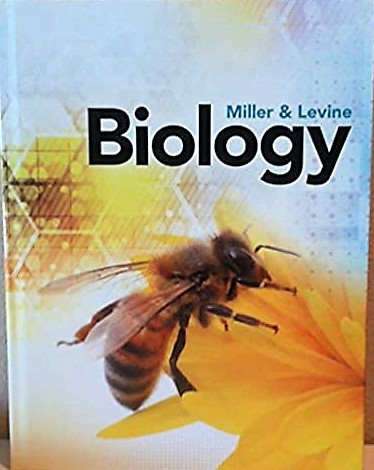Miller and Levine Biology
1st Edition
Joseph S. Levine, Kenneth R. Miller
ISBN: 9780328925124
Chapter 1: The Science of Biology
Page 14: Review
Page 21: Science in Context
Page 29: Review
Page 36: Assessment
Page 39: Test Practice
Chapter 2: The Chemistry of Life
Page 46: Review
Page 51: Review
Page 57: Review
Page 61: Review
Page 68: Assessment
Page 71: Test Practice
Chapter 3: The Biosphere
Page 84: Review
Page 91: Review
Page 97: Analyzing Data
Page 101: Review
Page 108: Assessment
Page 111: Test Practice
Chapter 4: Ecosystems
Page 117: Review
Page 122: Review
Page 131: Review
Page 138: Assessment
Page 141: Test Practice
Chapter 5: Populations
Page 151: Review
Page 155: Analyzing Data
Page 157: Review
Page 161: Review
Page 168: Assessment
Page 171: Test Practice
Chapter 6: Communities and Ecosystem Dynamics
Page 179: Analyzing Data
Page 181: Review
Page 185: Review
Page 189: Review
Page 196: Assessment
Page 199: Test Practice
Chapter 7: Humans and Global Change
Page 205: Review
Page 217: Review
Page 221: Analyzing Data
Page 222: Review
Page 225: Review
Page 232: Assessment
Page 235: Test Practice
Chapter 8: Cell Structure and Function
Page 247: Review
Page 257: Review
Page 265: Review
Page 269: Review
Page 276: Assessment
Page 279: Test Practice
Chapter 9: Photosynthesis
Page 285: Review
Page 290: Review
Page 297: Review
Page 304: Assessment
Page 307: Test Practice
Chapter 10: Cellular Respiration
Page 313: Review
Page 320: Review
Page 325: Review
Page 332: Assessment
Page 335: Test Practice
Chapter 11: Cell Growth and Division
Page 342: Review
Page 348: Review
Page 354: Review
Page 361: Review
Page 368: Assessment
Page 371: Test Practice
Chapter 12: Introduction to Genetics
Page 382: Review
Page 388: Review
Page 391: Analyzing Data
Page 392: Review
Page 399: Review
Page 406: Assessment
Page 409: Test Practice
Chapter 13: DNA
Page 417: Review
Page 423: Review
Page 427: Review
Page 434: Assessment
Page 437: Test Practice
Chapter 14: RNA and Protein Synthesis
Page 444: Review
Page 447: Analyzing Data
Page 450: Review
Page 456: Review
Page 461: Review
Page 468: Assessment
Page 471: Test Practice
Chapter 15: The Human Genome
Page 479: Review
Page 484: Review
Page 493: Review
Page 500: Assessment
Page 503: Test Practice
Chapter 16: Biotechnology
Page 508: Review
Page 515: Review
Page 523: Review
Page 527: Review
Page 534: Assessment
Page 537: Test Practice
Chapter 17: Darwin’s Theory of Evolution
Page 545: Analyzing Data
Page 548: Review
Page 554: Review
Page 559: Review
Page 567: Review
Page 574: Assessment
Page 577: Test Practice
Chapter 18: Evolution of Populations
Page 584: Review
Page 591: Review
Page 595: Review
Page 599: Review
Page 606: Assessment
Page 608: Assessment
Page 609: Test Practice
Chapter 19: Biodiversity and Classification
Page 618: Review
Page 628: Review
Page 636: Assessment
Page 639: Test Practice
Chapter 20: History of Life
Page 651: Review
Page 658: Review
Page 665: Review
Page 672: Assessment
Page 675: Test Practice
Chapter 21: Viruses, Prokaryotes, Protists, and Fungi
Page 688: Review
Page 697: Review
Page 703: Review
Page 709: Review
Page 716: Assessment
Page 719: Test Practice
Chapter 22: Plants
Page 726: Review
Page 736: Review
Page 749: Review
Page 756: Assessment
Page 759: Test Practice
Chapter 23: Plant Structure and Function
Page 775: Review
Page 783: Review
Page 787: Review
Page 794: Assessment
Page 797: Test Practice
Chapter 24: Animal Evolution, Diversity, and Behavior
Page 805: Review
Page 815: Review
Page 821: Review
Page 827: Review
Page 834: Assessment
Page 836: Assessment
Page 837: Test Practice
Chapter 25: Animal Systems I
Page 844: Review
Page 848: Review
Page 852: Review
Page 857: Review
Page 864: Assessment
Page 867: Test Practice
Chapter 26: Animal Systems II
Page 875: Review
Page 879: Review
Page 887: Review
Page 891: Review
Page 898: Assessment
Page 901: Test Practice
Chapter 27: The Human Body
Page 909: Review
Page 922: Review
Page 936: Review
Page 943: Review
Page 950: Assessment
Page 953: Test Practice


